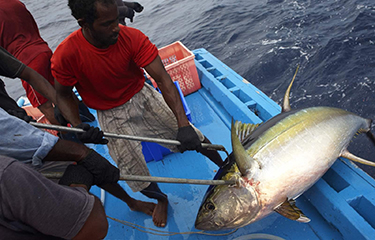The interim plan for rebuilding the Indian Ocean yellowfin tuna stock by the Indian Ocean Tuna Commission (IOTC) should target cooperation of large-scale industrial fishing fleets, as opposed to small-scale fishers, according to India’s Department of Fisheries.
India has objected to the IOTC’s resolution on the rebuilding of Indian Ocean yellowfin tuna. India Fisheries Development Commissioner Intisar Anees Siddiqui, in a letter to the IOTC Secretariat, said the large-scale industrial fishing fleets are to blame for reducing yellowfin tuna stocks in the Indian Ocean and “should bear much responsibility.”
The vessels, Siddiqui said, “exploit the share of the yellowfin tuna stocks and are responsible for the present status of stock of yellowfin tuna in the Indian Ocean.”
He said India supports efforts to have the industrial fishing fleets of developed and distant water fishing nations “reduce their catch to conserve and restore the yellowfin tuna stocks.”
“Putting the burden of sustainability on small-scale fishers and impacting the livelihoods of millions of such resource-poor fishers may not be a wise decision,” Siddiqui said.
Siddiqui added that India is unhappy with portions of IOTC resolution, especially the parts calling on developing countries that reported 5,000 metric tons or more of yellowfin tuna catch in 2014 to reduce the volume by 12 percent.
India has estimated most of its four million marine fishers “undertake fishing by multi-gear and multi-species non-selective fisheries and mostly confined to near-shore coastal areas.”
“Most of these small-scale fishing boats do not target tunas, but tunas are recorded as bycatch,” Siddiqui said.
Siddiqui said India is not entirely opposed to implementing the previous IOTC resolution prohibiting large-scale gillnets in the high seas, he said the proposal to phase out gillnet-fishing vessels by 1 January, 2022, is “impractical and objectionable” due to their widespread use by small-scale fishers for subsistence fishing.
Coastal states should be left to manage the fisheries within the exclusive economic zone as provided for in Article 16 of the IOTC agreement for exploiting, conserving, and management of living resources – including highly migratory species like yellowfin tuna, Siddiqui said. Such an approach, India said, will allow the coastal states to protect the interests of small-scale, resource-poor, and low-income fishers.
India joins Indonesia and Oman, which objected to the IOTC resolution on 30 June and 7 July, respectively.
At least 10 of the IOTC’s 30 members must object to the resolution by 17 December for it to be null and void. India, Indonesia, and Oman – and any other IOTC member objecting to the resolution – shall not be bound by the decision, but if at least 10 of the members reject the approval then the resolution is effectively nullified.
Photo courtesy of the Pew Charitable Trusts







